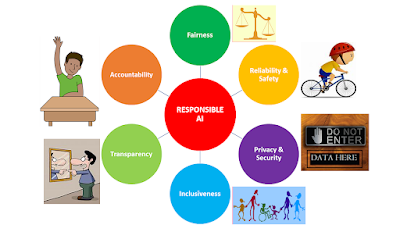Responsible AI refers to the ethical and thoughtful development, deployment, and use of artificial intelligence systems. It emphasizes principles and practices that ensure AI technologies benefit individuals and society while minimizing potential risks and harms. Key aspects of responsible AI include:
Transparency: Making AI systems understandable and their outcomes explainable to users and stakeholders.
Accountability: Ensuring that those responsible for the design and deployment of AI systems can be identified and held accountable for their actions.
Fairness and Bias Mitigation: Striving to eliminate biases in AI systems that could lead to unfair outcomes, particularly in sensitive areas like hiring, lending, and criminal justice.
Privacy: Respecting and protecting individuals' privacy rights throughout the data collection, processing, and utilization phases of AI systems.
Safety and Security: Ensuring AI systems are robust, reliable, and secure against potential malicious attacks or unintended failures.
Collaboration and Engagement: Encouraging interdisciplinary collaboration and engagement with diverse stakeholders, including policymakers, ethicists, and affected communities, to address ethical concerns and potential societal impacts of AI.
Impact Assessment: Conducting thorough assessments of the potential social, economic, and ethical impacts of AI systems before their deployment.
Human-centered Design: Prioritizing the well-being and interests of individuals and communities affected by AI technologies in the design and implementation processes.
Overall, responsible AI aims to foster trust in AI systems by promoting ethical behavior and societal benefit, ultimately ensuring that AI technologies contribute positively to human welfare and societal progress.
Certainly! Here are some additional aspects and considerations related to responsible AI:
Data Governance: Implementing robust data governance frameworks to ensure the responsible collection, storage, and usage of data, including considerations for data quality, relevance, and consent.
Ethical Use Cases: Prioritizing the development and deployment of AI technologies in applications that have clear societal benefits and minimize potential negative consequences.
Education and Awareness: Promoting education and awareness about AI ethics and responsible AI practices among developers, users, and the general public.
Regulation and Policy: Advocating for and complying with regulatory frameworks and policies that govern the development and deployment of AI systems, ensuring alignment with ethical standards and societal norms.
International Cooperation: Encouraging international cooperation and collaboration to develop global standards and guidelines for responsible AI, considering cultural, legal, and ethical differences across regions.
Continuous Monitoring and Evaluation: Establishing mechanisms for continuous monitoring, evaluation, and adaptation of AI systems to address emerging ethical concerns and societal impacts over time.
Human Rights: Ensuring that AI technologies respect and promote fundamental human rights, such as freedom of expression, non-discrimination, and the right to privacy.
Stakeholder Engagement: Engaging with a diverse range of stakeholders, including affected communities, advocacy groups, and experts from various disciplines, to incorporate diverse perspectives and ensure inclusive decision-making.
Long-term Impacts: Considering the long-term societal, economic, and environmental impacts of AI technologies, and taking proactive measures to mitigate potential risks and maximize benefits.
Responsible AI Leadership: Encouraging leadership within organizations and institutions to prioritize responsible AI practices and ethical considerations in strategic decision-making and innovation processes.
By integrating these aspects into AI development and deployment processes, stakeholders can work towards harnessing the full potential of AI technologies while addressing ethical challenges and ensuring alignment with societal values and priorities.
Certainly! Here are a few more aspects and considerations related to responsible AI:
Algorithmic Transparency: Ensuring transparency in the algorithms used by AI systems, including the inputs, processes, and outputs, to enable scrutiny and understanding of how decisions are made.
Accountability Mechanisms: Implementing mechanisms for accountability, such as audit trails, recourse procedures, and mechanisms for addressing errors or biases in AI systems.
Public Trust and Acceptance: Building public trust and acceptance of AI technologies through transparent communication, engagement, and education about their benefits, risks, and ethical considerations.
Human-in-the-loop and Human-on-the-loop: Integrating human oversight and intervention where necessary (human-in-the-loop) and ensuring human responsibility for decisions made by AI systems (human-on-the-loop), particularly in critical or sensitive applications.
Interpretability and Explainability: Designing AI systems to be interpretable and explainable, providing insights into how decisions are reached and enabling users to understand and trust the outputs.
Bias Detection and Mitigation: Developing techniques and tools to detect and mitigate biases in AI systems, including biases in data, algorithms, and decision-making processes.
Environmental Impact: Considering the environmental impact of AI technologies, such as energy consumption and carbon footprint, and developing strategies to minimize their ecological footprint.
Ethical Use in Research: Ensuring that AI research adheres to ethical principles, such as informed consent, respect for privacy, and minimizing potential harm to research subjects.
Cultural and Societal Impacts: Recognizing and addressing cultural and societal impacts of AI technologies, including potential effects on employment, social interactions, and cultural practices.
Dynamic Ethics: Embracing the concept of dynamic ethics, where ethical considerations evolve alongside technological advancements, societal changes, and new insights into AI's impacts.
Ethics by Design: Integrating ethical considerations into the design and development of AI systems from the outset, rather than as an afterthought or corrective measure.
Collaborative Governance: Fostering collaborative governance frameworks that involve multiple stakeholders in the development, deployment, and regulation of AI technologies to ensure balanced perspectives and inclusive decision-making.
These additional aspects emphasize the multifaceted nature of responsible AI and highlight the importance of proactive, inclusive, and ethical approaches to AI development and deployment. Integrating these considerations helps to maximize the benefits of AI while minimizing risks and ensuring alignment with societal values and ethical principles.



.jpeg)


.png)
.png)


